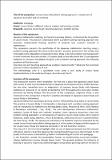Japanese lesson study and problem solving approach. In the symposium: Lesson Study and problem solving approach: a comparison of Japanese, Australian and, US contexts

Auteur, co-auteurs
Type de référence
Date
2019Langue de la référence
AnglaisRésumé
In Japanese primary schools, mathematics lessons are in a problem solving structured with several phases that serve both to prepare and to teach the lesson. One of these phases, neriage, is a whole-class discussion about different solutions of a problem. Teachers consider this phase as the heart of teaching mathematics through problem solving. This research focus on how a teacher manages neriage phases. Lessons take place in three kinds of schools with school-based and prefectural level lesson study. We question if it exists regularities or specificities in practices during neriage according to the kind of schools and lesson study. Teacher practices are analyzed with the cognitive and mediative components, from the double didactical and ergonomical approach. What are specific tasks, interventions, validation, helps and, explanation of knowledge managed by the teacher during neriage? This ongoing research highlights characteristics of practices during neriage promoted in the problem solving approach.Nom de la manifestation
WALSDate(s) de la manifestation
2-6 septembre 2019Ville de la manifestation
AmsterdamPays de la manifestation
HollandePortée de la manifestation
internationaleURL permanente ORFEE
http://hdl.handle.net/20.500.12162/3307Autre(s) URL(s) permanente(s)
https://drive.google.com/file/d/180ye2GmhXOdkPkF_ZDsZOGHSI9vh0z7k/viewDocument(s) associé(s) à la référence
Texte intégral :
Fichier
Accès
Commentaire
Taille
Ouvert
Résumé et textes des présentations du symposium " Lesson Study and problem solving approach: a comparison of Japanese, Australian and, US contexts"
124.6ko
Autre(s) document(s) :
Fichier
Accès
Commentaire
Taille
- Tout ORFEE
- Détail référence



